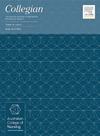Aboriginal and Torres Strait Islander nurses’ experiences of racism at work
IF 1.7
4区 医学
Q2 NURSING
引用次数: 0
Abstract
Glossary of term
It needs to be noted that First Nations Australians are also identified as Aboriginal and Torres Strait Islanders but also First Nations and Indigenous peoples of Australia. Further, many First Nations Australians self-identify as ‘blackfullas’. The word blackfullas has been reclaimed and reframed to the descriptor of the invading English identifying Indigenous peoples as Black fellows.
Background
Very few studies explore the perspectives of First Nations Australian nurses and their experiences of racism in the workplace. To date, racism in the Australian nursing and midwifery workforce is rarely researched, interrogated, or challenged. Despite this, experiences of racism are common, widespread, persistent, and present a harmful and significant challenge to recruiting, retaining, and supporting the health and well-being of the Aboriginal and Torres Strait Islander nursing workforce as demonstrated by the individual accounts of racism collected and analysed in this study. This workforce is integral to the provision of culturally safe, effective, and inclusive care for First Nations Australians, and racism in workplaces must be identified, examined, and understood to both address and end it.
Objective
To provide insights into workplace racism experiences in a way that is genuine to the First Nations’ nurse’s perspective.
Methods
This research is Indigenist Research and utilised the First Nations method of yarning. The Primary Investigator (PI) undertook all yarns via Zoom (30–90 min) and is an Aboriginal registered nurse. The space created for the yarns to occur was a culturally safe space as all research participants were known to the PI, and safe boundaries and spaces were established. All yarns undertaken were recorded via Zoom. Thematic data analysis was undertaken deductively, and participants were provided with transcripts for comment.
Results
Ten participants were recruited via the Queensland Nurses and Midwives Union (QNMU) First Nations Branch. Three salient and interrelated themes emerged from the analysis of the data, highlighting racism experiences and effects on First Nations nurses. The three themes were (in)direct racism, interjecting and calling out racism, and impacts of racism.
Discussion
This study investigated the detrimental effects of racism on Aboriginal and Torres Strait Islander nurses’ professional trajectories, sense of self within the healthcare environment, and overall well-being. The findings not only suggest a correlation between nurses’ experience and their willingness to confront racist incidents but also highlight the negative and harmful impacts this can have on participants. The willingness to confront and respond to racism might be attributed to accumulated frustration or a growing sense of agency in addressing these issues and could be a valuable phenomenon to investigate in future research. The study’s significance lies in its novelty in an emerging field, and its potential to inform larger-scale research endeavours and influence policy development in areas of workplace safety, Indigenous healthcare workforce strategies, cultural safety initiatives, and the fostering of more inclusive healthcare institutions.
Conclusions
Racism harms Aboriginal and Torres Strait Islander nurses’ careers, identity, safety, and social and emotional well-being. The more they experience it, the more likely they are to challenge it, perhaps out of frustration or empowerment; however, this takes its toll. Experiencing repeated overt and covert racism in the workplace is exhausting, and racism fatigue is proposed as a new concept that refers to how Aboriginal and Torres Strait Islander nurses might experience this ongoing and tiring demand, which could lead to many leaving their jobs or the nursing profession altogether. This study suggests a need for larger studies that utilise Indigenist methodologies, further examination and exploration of the phenomena of racism fatigue, and urgent policy changes to create a more supportive workplace free of racism.
原住民和托雷斯海峡岛民护士在工作中的种族主义经历
需要注意的是,澳大利亚的第一民族也被称为土著人和托雷斯海峡岛民,但也被称为澳大利亚的第一民族和土著人民。此外,许多第一民族澳大利亚人自认为是“黑富勒斯”。blackfullas这个词被重新定义,用来描述入侵的英国人将土著居民视为黑人。很少有研究探讨澳大利亚第一民族护士的观点和他们在工作场所的种族主义经历。迄今为止,澳大利亚护理和助产人员中的种族主义很少被研究、审问或挑战。尽管如此,种族主义的经历是普遍的、广泛的、持续的,并且对招募、保留和支持土著和托雷斯海峡岛民护理人员的健康和福祉构成了有害的重大挑战,正如本研究中收集和分析的种族主义个人账户所表明的那样。这些劳动力是为澳大利亚原住民提供文化安全、有效和包容的护理不可或缺的一部分,必须识别、检查和理解工作场所的种族主义,以解决和结束它。目的以一种真实的第一民族护士的视角,提供对工作场所种族主义经历的见解。方法本研究是土著研究,采用了第一民族的纺纱方法。首席调查员(PI)通过Zoom(30-90分钟)完成了所有的故事,他是一名土著注册护士。为故事的发生创造的空间是一个文化安全的空间,因为所有的研究参与者都是PI所认识的,并且建立了安全的边界和空间。所有的纱线都通过Zoom进行记录。专题数据分析是演绎法进行的,并向与会者提供文字记录以供评论。结果10名参与者通过昆士兰州护士和助产士联盟(QNMU)第一民族分会招募。从数据分析中出现了三个突出且相互关联的主题,突出了种族主义经历和对第一民族护士的影响。这三个主题是直接的种族主义,插入和呼吁种族主义,以及种族主义的影响。本研究旨在探讨种族主义对原住民和托雷斯海峡岛民护士职业轨迹、医疗环境中的自我意识和整体幸福感的不利影响。研究结果不仅表明护士的经历与她们面对种族主义事件的意愿之间存在相关性,而且还强调了这可能对参与者产生的负面和有害影响。面对和应对种族主义的意愿可能归因于积累的挫败感或在解决这些问题时日益增强的能动性,这可能是一个有价值的现象,可以在未来的研究中进行调查。这项研究的意义在于它在一个新兴领域的新颖性,它有可能为更大规模的研究工作提供信息,并影响工作场所安全、土著保健人力战略、文化安全倡议和促进更具包容性的保健机构等领域的政策制定。结论种族主义损害了原住民和托雷斯海峡岛民护士的职业、身份、安全、社会和情感健康。他们经历得越多,他们就越有可能挑战它,也许是出于沮丧或授权;然而,这是有代价的。在工作场所反复经历公开和隐蔽的种族主义是令人筋疲力尽的,种族主义疲劳被提出作为一个新概念,指的是土著和托雷斯海峡岛民护士如何经历这种持续和令人疲惫的需求,这可能导致许多人离开他们的工作或完全离开护理专业。这项研究表明,需要进行更大规模的研究,利用本土主义的方法,进一步检查和探索种族主义疲劳现象,并紧急改变政策,以创造一个更支持性的、没有种族主义的工作场所。
本文章由计算机程序翻译,如有差异,请以英文原文为准。
求助全文
约1分钟内获得全文
求助全文
来源期刊

Collegian
NURSING-
CiteScore
2.70
自引率
6.70%
发文量
127
审稿时长
72 days
期刊介绍:
Collegian: The Australian Journal of Nursing Practice, Scholarship and Research is the official journal of Australian College of Nursing (ACN).
The journal aims to reflect the broad interests of nurses and the nursing profession, and to challenge nurses on emerging areas of interest. It publishes research articles and scholarly discussion of nursing practice, policy and professional issues.
Papers published in the journal are peer reviewed by a double blind process using reviewers who meet high standards of academic and clinical expertise. Invited papers that contribute to nursing knowledge and debate are published at the discretion of the Editor.
The journal, online only from 2016, is available to members of ACN and also by separate subscription.
ACN believes that each and every nurse in Australia should have the opportunity to grow their career through quality education, and further our profession through representation. ACN is the voice of influence, providing the nursing expertise and experience required when government and key stakeholders are deciding the future of health.
 求助内容:
求助内容: 应助结果提醒方式:
应助结果提醒方式:


